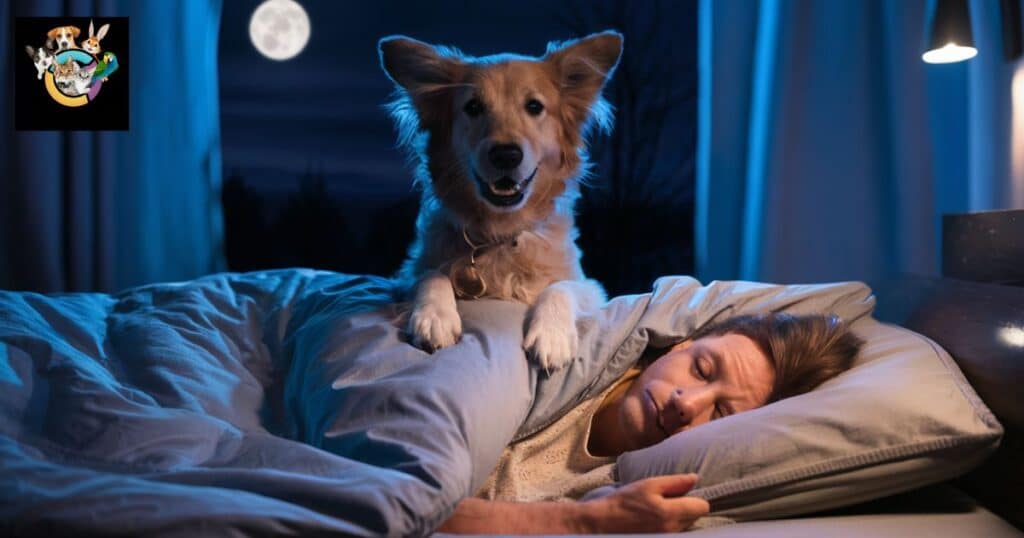As a dog owner, you know how important a good night’s sleep is, both for you and your furry companion. However, many pet parents struggle with their dogs waking up frequently throughout the night, leading to restless sleep for everyone involved.
If you find yourself asking, “Why does my dog wake up in the middle of the night?”, you’re not alone. In this comprehensive guide, we’ll explore the various reasons behind this common issue and provide tips to help your pup (and you) sleep soundly through the night.
Understanding Canine Sleep Patterns
Before diving into the potential causes of nighttime wakings, it’s important to understand a dog’s natural sleep patterns. Dogs are polyphasic sleepers, meaning they sleep in multiple shorter intervals throughout the day and night, rather than one long stretch like humans. On average, dogs spend about 50% of their day sleeping, which equates to around 12-14 hours of sleep per 24-hour period.
During their sleep cycles, dogs alternate between different stages of sleep, including light sleep (similar to human REM sleep) and deep sleep. It’s during the lighter stages of sleep that dogs are more easily awakened by external stimuli or internal cues, contributing to nighttime wakings.
The Biological Clock of Dogs: Nighttime Behavior

Just like humans, dogs have an internal biological clock known as their circadian rhythm. This internal clock is influenced by various factors, including hormones like melatonin, which regulate sleep-wake cycles. Dogs tend to be more active and alert during the dawn and dusk hours, which is rooted in their ancestors’ hunting patterns.
As a result, you may notice your dog being more restless or prone to waking up during these times, even if they’ve had adequate sleep throughout the day.
Common Reasons Why Dogs Wake Up at Night
There are numerous potential reasons why your dog may be waking up in the middle of the night, ranging from behavioral to medical causes. Here are some of the most common culprits:
- Environmental factors (noise, light, temperature changes)
- Health issues (pain, cognitive dysfunction, heart disease, etc.)
- Anxiety or stress (separation anxiety, fear, general distress)
- Age-related changes (puppies and senior dogs have different sleep needs)
- Hunger or thirst (especially for puppies, seniors, or dogs on certain diets/medications)
- Lack of adequate exercise
- Attention-seeking behavior
- External stimuli (outdoor noises, indoor lights, household activity)
- Discomfort or poor sleeping surface
- Separation anxiety (when left alone at night)
As you can see, the reasons for nighttime wakings can vary widely, and in some cases, multiple factors may be at play. Let’s dive deeper into some of these common causes and explore strategies to help your pup (and you) get a better night’s sleep.
Environmental Factors Impacting Canine Sleep
Dogs have incredibly sensitive senses, and their sleep can be easily disrupted by various environmental factors in their sleeping area. Loud noises, bright lights, temperature fluctuations, and even subtle changes in their surroundings can rouse them from their slumber.
Here are some tips to create an optimal sleep environment for your dog:
- Keep their sleeping area quiet and free from excessive noise (consider using a white noise machine or earplugs for yourself)
- Ensure the room is dark and cool (around 65-70°F is ideal)
- Use blackout curtains or an eye mask for your dog if needed
- Provide a comfortable, supportive sleeping surface (consider an orthopedic dog bed)
- Minimize disturbances and household activity during the night
By creating a calm, consistent, and comfortable sleep space, you can help minimize environmental disruptions and promote better sleep for your furry friend.
Health Issues That Might Disrupt Dog’s Sleep
In some cases, nighttime wakings can be a symptom of an underlying health issue. Various medical conditions, such as pain, cognitive dysfunction, heart disease, respiratory problems, and urinary tract infections, can interfere with a dog’s ability to sleep through the night.
Here are some common health issues that may contribute to sleep disturbances in dogs:
- Pain (arthritis, injuries, dental issues)
- Cognitive Dysfunction (similar to dementia in humans)
- Heart Disease (leading to breathing difficulties or discomfort)
- Respiratory Issues (asthma, allergies, or other breathing problems)
- Urinary Tract Infections (causing frequent urination)
- Gastrointestinal Issues (diarrhea, vomiting, or discomfort)
- Endocrine Disorders (such as diabetes or Cushing’s disease)
If you notice your dog exhibiting unusual behavior, such as restlessness, excessive vocalization, or apparent discomfort during the night, it’s always best to consult with your veterinarian. They can help rule out any underlying medical conditions and provide appropriate treatment to help alleviate your dog’s nighttime distress.
Anxiety and Stress: How They Affect Dog’s Sleep
Just like humans, dogs can experience anxiety and stress, which can significantly impact their sleep quality. Separation anxiety, fear, and general distress can all contribute to restless nights and frequent wakings.
Some common signs of anxiety-related sleep disturbances in dogs include:
- Excessive vocalization (whining, barking, or howling)
- Destructive behavior (chewing, digging, or scratching)
- Pacing or restlessness
- Panting or trembling
- Excessive licking or self-grooming
To help manage anxiety and promote better sleep, consider implementing the following strategies:
- Provide plenty of exercise and mental stimulation during the day
- Use calming aids like pheromone diffusers or supplements (consult your vet)
- Create a cozy, secure sleeping space for your dog
- Practice positive reinforcement training to build confidence
- Gradually desensitize your dog to triggers that cause anxiety
Addressing your dog’s anxiety and stress levels can go a long way in improving their sleep quality and overall well-being.
Age and Sleep: Puppies vs. Adult Dogs
A dog’s sleep needs and patterns can vary significantly depending on their age. Puppies, for example, require more frequent naps and longer periods of sleep as they grow and develop. On the other hand, senior dogs may experience changes in their sleep cycles due to age-related conditions like cognitive dysfunction or arthritis.
Here’s a quick overview of how sleep needs differ between puppies and adult dogs:
Puppies:
- Sleep up to 20 hours per day (in short intervals)
- Need more frequent nap times and shorter wake periods
- May wake up more often due to hunger, thirst, or need for potty breaks
Adult Dogs:
- Sleep around 12-14 hours per day (in longer stretches)
- Have more consistent sleep-wake cycles
- May experience age-related sleep changes as they get older
It’s important to accommodate your dog’s age-specific sleep needs and make adjustments as they progress through different life stages. Providing a comfortable sleeping area, adhering to a consistent routine, and addressing any age-related health issues can help ensure your dog gets the rest they need.
Relevant Post: Goldendoodle Potty Training (2023) A Complete Guide
Hunger and Thirst: Nighttime Needs of Dogs
One of the most straightforward reasons why dogs may wake up during the night is due to hunger or thirst. This is especially common in puppies, who have smaller stomachs and need to eat more frequently, as well as in senior dogs or those with certain medical conditions that increase their need for food or water.
Here are some tips to address hunger and thirst-related nighttime wakings:
- Establish a consistent feeding schedule that provides adequate nutrition throughout the day
- Provide access to fresh water at all times, both during the day and at night
- Consider adjusting feeding times or adding a late evening snack for puppies or senior dogs
- Consult with your veterinarian if your dog is on a special diet or medication that may affect their hunger or thirst levels
By ensuring your dog’s basic needs for food and water are met, you can minimize the chances of them waking up due to hunger or thirst, leading to more restful nights for both of you.
The Influence of Exercise on Canine Sleep
Regular exercise plays a crucial role in promoting healthy sleep patterns in dogs. Just like humans, dogs who engage in sufficient physical activity throughout the day are more likely to sleep soundly at night.
Here are some benefits of exercise for canine sleep:
- Helps burn off excess energy and reduce restlessness
- Promotes physical and mental stimulation, leading to better sleep quality
- Can alleviate anxiety and stress, which can disrupt sleep
- Encourages natural fatigue and a desire to rest
However, it’s important to strike the right balance when it comes to exercise and sleep. Too much physical activity, especially close to bedtime, can overstimulate your dog and make it harder for them to wind down and fall asleep. Conversely, insufficient exercise can lead to pent-up energy and restlessness, contributing to nighttime wakings.
To promote optimal sleep through exercise, consider the following tips:
- Aim for at least 30-60 minutes of moderate to vigorous exercise per day (adjust based on your dog’s age, breed, and individual needs)
- Incorporate a variety of activities, such as walking, running, playing fetch, or engaging in dog sports
- Schedule exercise sessions earlier in the day, allowing your dog time to wind down before bedtime
- Engage in mentally stimulating activities, like nose work or trick training, to provide mental exercise
By incorporating regular, appropriate exercise into your dog’s routine, you can help them expend energy, reduce stress levels, and promote deeper, more restful sleep at night.
Attention-Seeking Behavior in Dogs

In some cases, dogs may wake up during the night simply because they want attention or affection from their owners. This behavior can often be unintentionally reinforced if the dog is rewarded with attention, treats, or playtime when they wake up.
Signs that your dog may be exhibiting attention-seeking behavior at night include:
- Whining, barking, or pawing at you
- Jumping on the bed or trying to cuddle up to you
- Bringing toys or objects to you
- Exhibiting playful or excited behavior
While it’s tempting to give in to your dog’s demands for attention, it’s important to avoid reinforcing this behavior, as it can quickly become a habit that disrupts everyone’s sleep.
Instead, try implementing the following strategies:
- Ignore the attention-seeking behavior and avoid responding or reacting
- Reward your dog with attention or treats when they are calm and relaxed
- Provide plenty of exercise, playtime, and mental stimulation during the day
- Establish a consistent bedtime routine that signals it’s time to wind down
- Consider crate training or confining your dog to a separate sleeping area if the behavior persists
By addressing attention-seeking behavior through positive reinforcement training and consistent routines, you can help discourage nighttime wakings and encourage better sleep habits for your furry friend.
External Stimuli: Noise, Light, and Disturbances
Dogs have incredibly keen senses, and even seemingly minor external stimuli can disrupt their sleep. Loud noises from outside or within your home, bright lights, and household disturbances can all contribute to nighttime wakings.
Here are some common external stimuli that may impact your dog’s sleep:
- Outdoor noises (traffic, construction, barking dogs, etc.)
- Indoor noises (TV, music, appliances, etc.)
- Bright lights (streetlights, indoor lighting, etc.)
- Household activity (people moving around, doors opening/closing, etc.)
- Changes in routine or environment (guests, renovations, etc.)
To minimize the impact of external stimuli, consider the following tips:
- Use sound-proofing materials or white noise machines to mask outdoor noises
- Keep your dog’s sleeping area as quiet and dark as possible
- Limit household activity and noise during the night
- Use blackout curtains or eye masks to block out light
- Maintain a consistent routine and sleeping environment for your dog
By creating a calm, predictable, and low-stimulation sleep environment, you can help reduce the likelihood of external stimuli disrupting your dog’s sleep.
Comfort and Temperature: Creating an Ideal Sleep Environment
In addition to minimizing external stimuli, ensuring your dog’s comfort and ideal temperature conditions can also contribute to better sleep quality. Just like humans, dogs prefer a comfortable, supportive sleeping surface and an environment that isn’t too hot or too cold.
Here are some tips for creating a cozy and comfortable sleep environment for your dog:
- Provide a high-quality, orthopedic dog bed that offers proper support and cushioning
- Use soft, breathable bedding materials that can be easily washed and refreshed
- Ensure the sleeping area is well-ventilated and maintained at a comfortable temperature (around 65-70°F is ideal)
- Consider using a fan or air conditioning during warmer months to prevent overheating
- Offer cozy blankets or a covered crate for dogs who prefer a den-like sleeping space
By addressing your dog’s comfort and temperature needs, you can help them feel relaxed and secure, promoting deeper, more restful sleep throughout the night.
Separation Anxiety: Coping with Nighttime Distress
For dogs who experience separation anxiety, being left alone at night can be a significant source of stress and disrupted sleep. This anxiety can manifest in various ways, such as excessive vocalization, destructive behavior, restlessness, or even attempts to escape their sleeping area.
If your dog exhibits signs of separation anxiety at night, consider the following management techniques:
- Crate training or creating a secure, comfortable sleeping area
- Providing interactive toys or puzzle feeders to keep them occupied
- Using calming aids like pheromone diffusers or supplements (consult your vet)
- Gradually desensitizing your dog to being alone through positive reinforcement training
- Exploring options like doggie daycare or overnight pet sitters if the anxiety is severe
Addressing separation anxiety can take time and patience, but it’s crucial for your dog’s overall well-being and sleep quality. Consult with a professional dog trainer or behaviorist if you need additional guidance.
Behavioral Training Techniques for Better Sleep Habits

While addressing the underlying causes of nighttime wakings is essential, implementing positive reinforcement training techniques can also help your dog develop better sleep habits over time.
Here are some effective training strategies to consider:
- Establish a consistent bedtime routine that signals it’s time to wind down (e.g., a potty break, a calming activity, and then settling in their sleeping area)
- Use positive reinforcement (treats, praise, etc.) to reward calm, relaxed behavior in their sleeping area
- Gradually increase the duration your dog can remain calmly in their sleeping area before rewarding them
- Incorporate calming exercises like gentle massages or deep pressure therapy
- Use calming aids like pheromone diffusers or calming supplements (consult your vet)
- Provide safe, interactive toys or puzzle feeders to keep them occupied in their sleeping area
By consistently reinforcing desired behaviors and creating positive associations with their sleeping area, you can help your dog develop better sleep habits that benefit both of you.
Consulting a Veterinarian: When to Seek Professional Help
While many nighttime wakings can be addressed through environmental adjustments, training, and behavior management techniques, there may be instances where an underlying medical condition is contributing to your dog’s sleep disturbances.
Here are some red flags that indicate it’s time to consult your veterinarian:
- Chronic or persistent sleep disturbances that don’t improve with other interventions
- Changes in your dog’s sleep patterns accompanied by other concerning symptoms (lethargy, appetite changes, etc.)
- Excessive vocalization, restlessness, or apparent discomfort during the night
- Age-related changes in sleep patterns that seem abnormal or concerning
Your veterinarian can perform a thorough examination, run diagnostic tests if needed, and rule out or address any potential medical issues that may be impacting your dog’s sleep. They can also provide guidance on appropriate treatments or management strategies specific to your dog’s needs.
Conclusion
Dealing with a dog who wakes up frequently during the night can be frustrating and exhausting for both you and your furry companion. However, by understanding the various reasons behind nighttime wakings and implementing a combination of environmental adjustments, training techniques, and addressing any underlying health or behavioral issues, you can help promote better sleep habits for your pup.
Remember, every dog is unique, and it may take some trial and error to find the right approach that works best for your furry friend. Be patient, consistent, and don’t hesitate to consult with your veterinarian or a professional dog trainer or behaviorist if you need additional guidance.
With dedication and a commitment to addressing your dog’s sleep needs, you can both enjoy the rest and rejuvenation that comes with a good night’s sleep.






